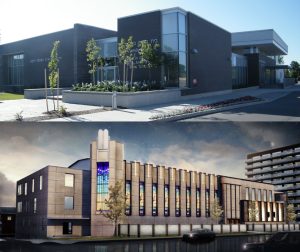 TORONTO — Rabbi Mordechai Lebhar, the new rosh kolel of Kollel Yismach Moshe – The Sephardic Outreach Centre, says he wants to provide as many learning opportunities as possible for people at all levels of religious observance.
TORONTO — Rabbi Mordechai Lebhar, the new rosh kolel of Kollel Yismach Moshe – The Sephardic Outreach Centre, says he wants to provide as many learning opportunities as possible for people at all levels of religious observance.
Rabbi Mordechai Lebhar
The 35-year-old Montreal native moved to Toronto from Los Angeles to replace former Rosh Kollel Rabbi Eliyahu Attias at the beginning of September. Rabbi Attias retired and made aliyah.
Rabbi Lebhar, who received smichah from the chief rabbi of Jerusalem 15 years ago, served most recently as rosh kolel at the Los Angeles Intercommunity Kollel in Westwood, Calif.
“There is a movement like a silent revolution of kolelim sprouting all across North America,” he said, citing examples in cities as diverse as Las Vegas, Seattle, Phoenix, and Calgary.
Kolels – Torah learning centres, often for married Orthodox men – “shape a lot of Jewish communities,” the rabbi said. “The kolel is a place where young Torah scholars are able to build themselves more, like on a post-graduate level. They spend most of their day learning and researching and developing themselves more, until they move on to positions in the community.”
His priority, he said, is ensuring kolel classes are stimulating and challenging so that students at all levels can make Torah part of their lives.
“Any change – even one that looks like a micro-change – that makes a person smile at his neighbour, say a kinder word, be honest in business, or make an extra tfillah, is a gain for the Jewish community and the world at large.”
Among the classes offered at Yismach Moshe – a 10-year-old institution located on Bainbridge Avenue near Bathurst Street and Sheppard Avenue – are philosophy, halachah, Gemara and ethics. Separate classes are offered for men and women, taught by an all-male faculty of six full-time and four part-time staff.
Although Yismach Moshe welcomes everyone, it’s geared to the Sephardi community, said Rabbi Lebhar.
Rabbi Yaron Razak, principal of Or HaEmet Sephardic School, and Rabbi Shmuel Pinto of Magen David Sephardic Congregation are among Sephardi community leaders who have studied at the kolel, Rabbi Lebhar said. “This is all a ripple effect and a way to build the community.”
Rabbi Lebhar, who has written a book on Moroccan Jewish customs, said that he is heavily rooted in Sephardi tradition despite having studied in Ashkenazi yeshivot, including the Telshe Yeshiva in Chicago. He also spent 10 years studying in Israel, and taught Halachah (Jewish law) at Yeshivat Darché Noam/David Shapell College of Jewish Studies in Jerusalem.
In Los Angeles, he was rabbi of a Sephardi minyan in an Ashkenazi kolel, an arrangement he described as very harmonious.
It’s “a mistake” to put everyone in one minyan, he believes. He likens the situation to marriage.
“Each person retains their individuality, and then they find common ground,” said the married father of seven. “Taking away someone’s individuality is not the healthiest approach. Each one has a beautiful culture and heritage.”
The Torah binds the two communities, he said. “The Torah is the same.”






